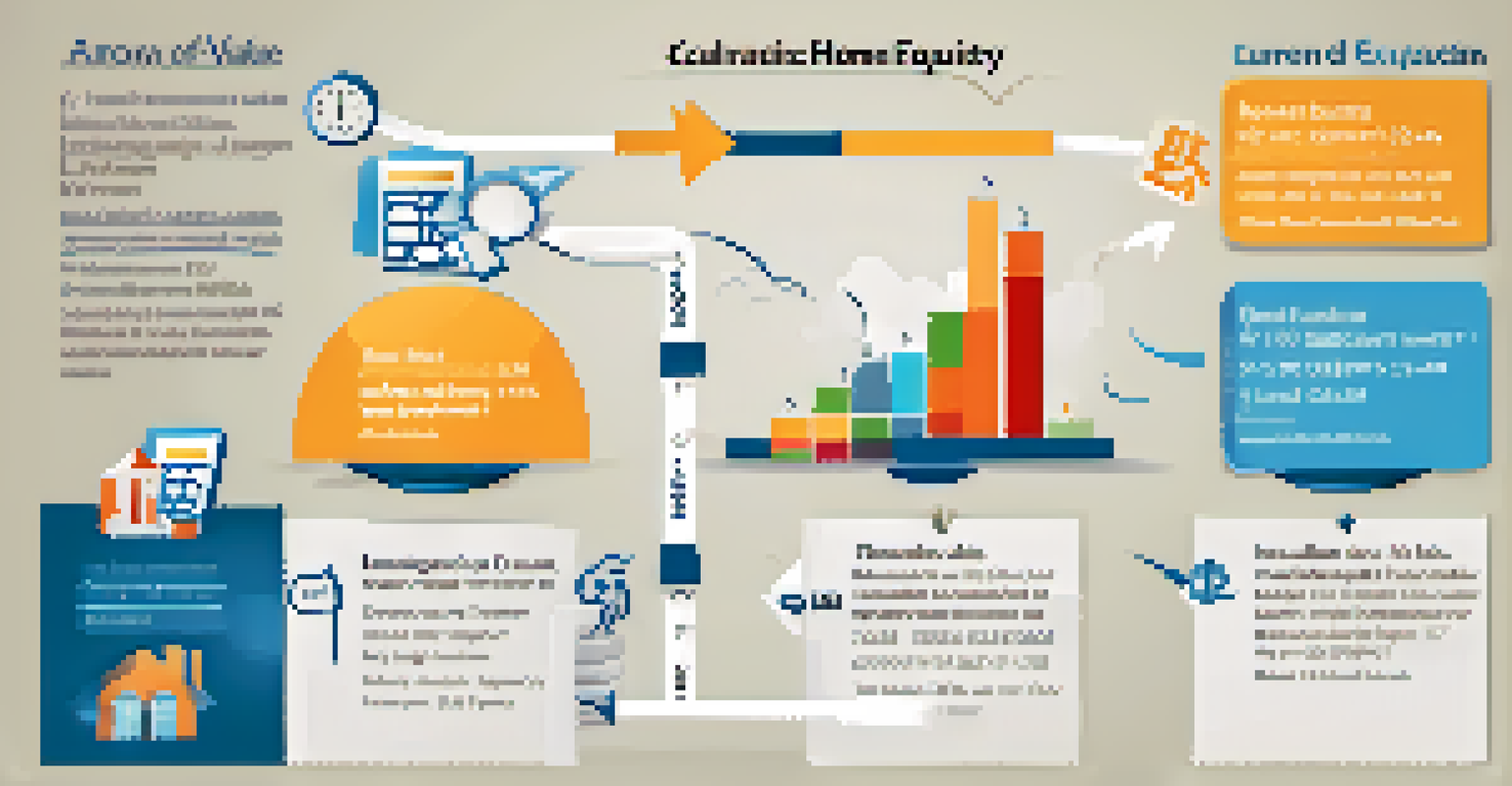How Home Equity is Calculated: A Step-by-Step Guide

Understanding Home Equity: The Basics
Home equity is essentially the portion of your home that you truly own. It is calculated by taking your home's current market value and subtracting any outstanding mortgage balances. For example, if your home is worth $300,000 and you owe $200,000 on your mortgage, your home equity would be $100,000.
Home equity is a powerful tool that can help you achieve your financial goals.
This concept is crucial because it can be a valuable financial resource. Home equity can be accessed through loans or lines of credit, allowing homeowners to fund major expenses like renovations, education, or debt consolidation. Understanding how equity works can empower you to make informed financial decisions.
It's essential to recognize that home equity fluctuates with real estate market conditions. As property values rise or fall, so does your equity. Therefore, keeping an eye on your home's market value is vital for effective financial planning.
Calculating Your Home's Current Market Value
To determine your home equity, the first step is to assess your home's current market value. This can be achieved through various methods, including a professional appraisal, online valuation tools, or by comparing recent sales of similar homes in your area. Each method offers a different level of accuracy.

A professional appraisal is often the most reliable option, as appraisers consider several factors like location, condition, and recent market trends. On the other hand, online tools can provide a quick estimate but may lack precision. Using multiple methods can give you a more comprehensive picture.
Remember that market conditions can change rapidly. If you’re considering tapping into your home equity, ensure that your assessment is recent to reflect the current real estate landscape accurately.
Finding Your Outstanding Mortgage Balance
Once you have an accurate market value, the next step is to determine your outstanding mortgage balance. This is the total amount you still owe on your home loan, which can usually be found on your latest mortgage statement or by contacting your lender. Understanding this figure is crucial for calculating your equity.
Your home is not just a place to live; it's also a valuable asset that can work for you.
It's important to remember that your mortgage balance decreases over time as you make payments. However, if you’ve refinanced or taken out additional loans, your balance may be higher than you expect. Keeping track of your balance helps you stay informed about your financial situation and equity.
If you’re unsure about your balance, don’t hesitate to reach out to your lender for clarification. Knowing where you stand financially is key to making informed decisions regarding your home equity.
The Home Equity Calculation Formula
Now that you have both your home’s market value and outstanding mortgage balance, you can use a simple formula to calculate your equity. The formula is: Home Equity = Current Market Value - Outstanding Mortgage Balance. For instance, if your home is worth $400,000 and you owe $250,000, your equity would be $150,000.
This calculation is straightforward but incredibly powerful. Knowing this number can help you evaluate your financial options, such as refinancing or securing a home equity loan. It’s a vital part of managing your personal finances and planning for the future.
Always keep in mind that this figure can change over time. Regularly updating your calculations will help you stay on top of your financial health.
Factors That Influence Home Equity
Several factors can influence your home equity, including market conditions, property improvements, and changes in your mortgage balance. For instance, a booming real estate market can increase your home's value, thus boosting your equity. Conversely, a downturn can diminish it.
Making improvements to your property can also enhance its value. A new kitchen or bathroom remodel can significantly increase your home’s market value, translating into higher equity. However, not all renovations yield the same return, so choose wisely.
Lastly, your mortgage payments play a crucial role in equity accumulation. The more you pay down your mortgage, the greater your equity will grow over time. Regular payments and a strategic approach to refinancing can help you build wealth through home equity.
Accessing Your Home Equity: Options Available
Once you've calculated your home equity, you may want to access it for various purposes. Homeowners often tap into their equity through home equity loans or lines of credit (HELOCs). These options allow you to borrow against your equity, giving you access to funds for major expenses.
A home equity loan provides a lump sum payment with a fixed interest rate, while a HELOC works more like a credit card, giving you a revolving credit line based on your equity. Both options can be helpful but come with responsibilities, so it's important to evaluate your financial situation before proceeding.
Consulting with a financial advisor can help you understand which option best suits your needs. Having a clear plan for how you will use the funds is essential to ensuring that tapping into your equity benefits you in the long run.
Maintaining and Monitoring Your Home Equity
Maintaining and monitoring your home equity is an ongoing process. Regularly check your home's market value and mortgage balance to keep your calculations current. This awareness will help you make informed decisions about refinancing or accessing equity for future expenses.
Consider setting reminders to review your financial documents at least once a year. This practice not only helps you stay informed about your equity but also allows you to adjust your financial strategies as needed. Life changes, and so do market conditions, so adaptability is key.

Lastly, remember that building home equity takes time and effort. With careful planning and regular monitoring, you can maximize your home’s potential as a financial asset.